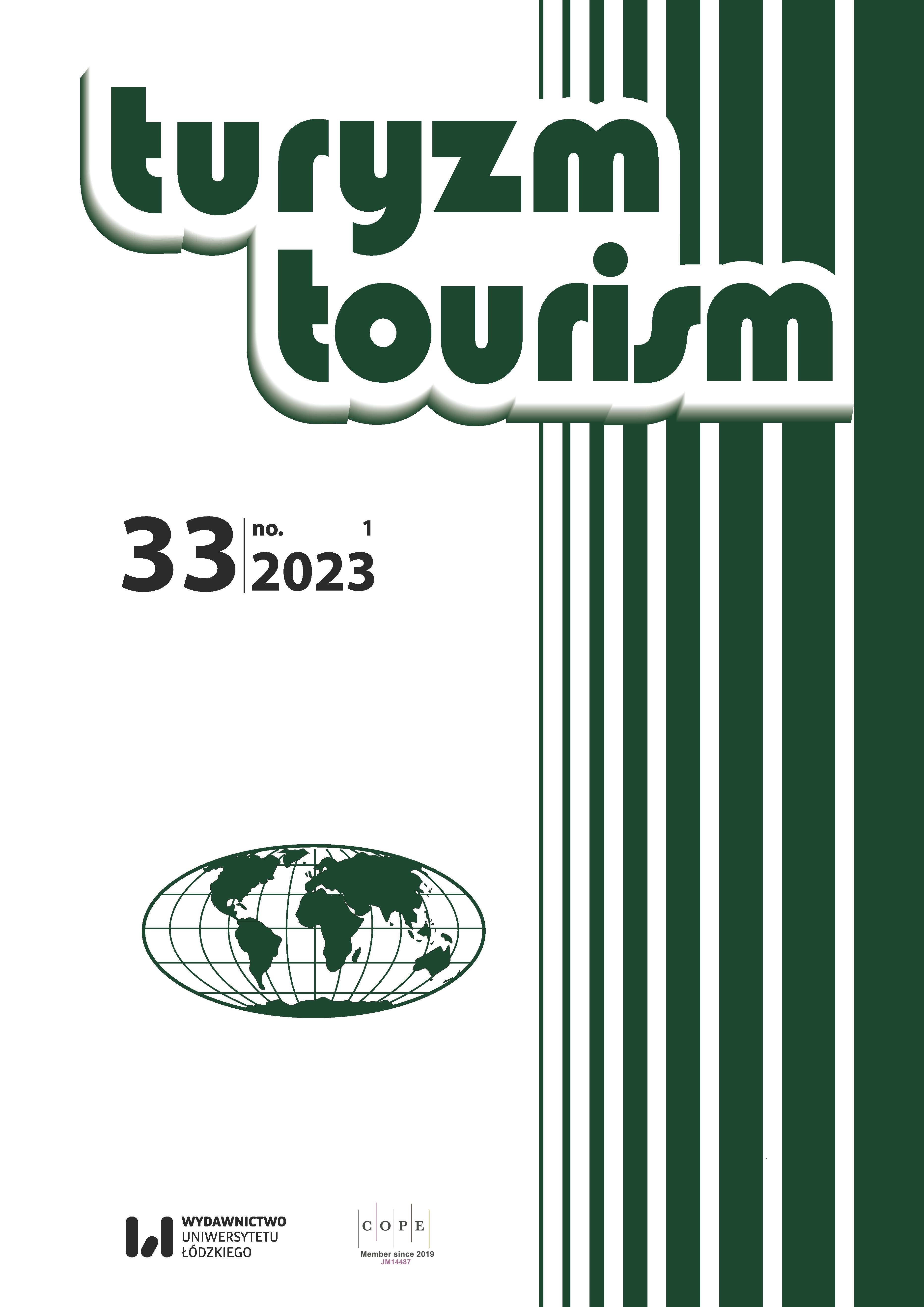Identifying quality gaps in tourism for people with disabilities: Importance-Performance Analysis (IPA)
DOI:
https://doi.org/10.18778/0867-5856.33.1.04Keywords:
tourism of people with disabilities, Importance-Performance Analysis, quality gapsAbstract
The aim of the article is to assess the significance (importance) and level of inconvenience of selected attributes of tourist services provided at particular stages of the supply chain in tourism (information, accommodation, transport, organization and intermediation) in relation to people with various types and degrees of disability. The survey conducted among the disabled helped to identify quality gaps in the provision of tourism services, taking into account their complementarity and accessibility at every stage of delivery. The method of Importance-Performance Analysis (IPA) and basic measures of descriptive statistics were used to analyze empirical data. The study will help to indicate to what extent the tourist experience of a disabled person and the type of disability affect the assessment of the significance (importance) and inconvenience of selected attributes of tourist services. The results of the research can be used by entrepreneurs to analyze the quality and reliability of services provided by their partners and the behavior and needs of the disabled in tourism. They will also be useful for local and regional authorities responsible for ensuring the competitiveness and inclusiveness of tourism regions.
Downloads
References
Akgül, Y., Vatansever, K. (2016). Web accessibility evaluation of government websites for people with disabilities in Turkey. Journal of Advanced Management Science, 4(3), 201–210. http://www.joams.com/uploadfile/2015/0407/20150407052826694.pdf
Google Scholar
DOI: https://doi.org/10.12720/joams.4.3.201-210
Benckendorff, P.J., Sheldon, P.J., Fesenmaier, D.R. (2014). Tourism information technology. Wallingford (UK): CABI.
Google Scholar
DOI: https://doi.org/10.1079/9781780641850.0000
Biesok, G., Wróbel, J. (2015). Podejścia do analizy IPA w badaniach satysfakcji klienta. Problemy Jakości, 1(6), 28–32.
Google Scholar
DOI: https://doi.org/10.15199/46.2015.6.5
Djeri, L., Stamenković, P., Blešić I., Milićević, S., Ivkov, M. (2018). An importance-performance analysis of destination competitiveness factors: Case of Jablanica district in Serbia. Economic Research – Ekonomska Istraživanja, 31(1), 811–826. https://doi.org/10.1080/1331677X.2018.1456351
Google Scholar
DOI: https://doi.org/10.1080/1331677X.2018.1456351
Dwyer, L., Darcy, S. (2011). Economic contribution of tourists with disabilities: An Australian approach and methodology. In D. Buhalis, S. Darcy (Eds.), Accessible tourism: Concept and issues, 213–239. Bristol (UK): Channel View Publications.
Google Scholar
Economic Impact and Travel Patterns of Accessible Tourism in Europe – Final Report Summary. (2013). European Commission, DG Enterprise and Industry. https://www.accessibletourism.org/resources/toolip/doc/2014/07/06/study-a-economic-impact-and-travel-patterns-of-accessible-tourism-in-europe---fi.pdf
Google Scholar
Enamorado, S. (2017). Countries that have adopted WCAG standards. Retrieved September 24, 2022, from: https://www.3playmedia.com/2017/08/22/countries-that-have-adopted-wcagstandards-map/
Google Scholar
European Commission, DG Enterprise and Industry. (2013). Economic impact and travel patterns of accessible tourism in Europe – final report summary. https://www.accessibletourism.org/resources/toolip/doc/2014/07/06/study-a-economic-impact-and-travel-patterns-of-accessible-tourism-in-europe---fi.pdf
Google Scholar
Fundusze Europejskie. (2018). Ostateczne rekomendacje w części dotyczącej zmian pozaprawnych wraz z ocenami skutków społeczno-gospodarczych proponowane do wprowadzenia w 24 politykach publicznych w celu ich dostosowania do postanowień „Konwencji o prawach osób niepełnosprawnych” na poziomie krajowym oraz regionalno-lokalnym. https://www.funduszeeuropejskie.gov.pl/media/56903/ostatecznerekomendacjepozaprawne.pdf
Google Scholar
Kusterska-Jefmańska, M., Jefmański, B. (2011). Zastosowanie metody IPA w badaniu jakości usług edukacyjnych szkoły wyższej. Prace Naukowe Uniwersytetu Ekonomicznego we Wrocławiu, 151, 383–401.
Google Scholar
Lotko, M. (2018). Wykorzystanie analizy ważności-realizacji do badania jakości usług edukacyjnych w zakresie nauczania języków obcych. Zeszyty Naukowe. Organizacja i Zarządzanie / Politechnika Śląska, 131, 311–318.
Google Scholar
Łopatecka, K., Żarski, K. (2020). Servqual. In Encyklopedia zarządzania. https://mfiles.pl/pl/index.php/Servqual
Google Scholar
Martilla, J., James, J. (1977). Importance-Performance Analysis. Journal of Marketing, 41(1), 77–79. https://www.jstor.org/stable/1250495?seq=1
Google Scholar
DOI: https://doi.org/10.1177/002224297704100112
Mayordomo-Martínez, D., Sánchez-Aarnoutse, J-C., Carrillo-de-Gea, J.M., García-Berná, J.A., Fernández-Alemán, J.L., García-Mateos, G. (2019). Design and development of a mobile app for accessible beach tourism information for people with disabilities. International Journal of Environmental Research and Public Health, 16(12), Article 2131. https://doi.org/10.3390/ijerph16122131
Google Scholar
DOI: https://doi.org/10.3390/ijerph16122131
Neumann, P., Reuber, P. (2004). Economic impulses of accessible tourism for all (vol. 526). Berlin: Study commissioned by the Federal Ministry of Economics and Technology & Federal Ministry of Economic and Labour (BMWA).
Google Scholar
Porto, N., Rucci, A.C., Ciaschi, M. (2018). Tourism accessibility competitiveness. A regional approach for Latin American countries. Journal of Regional Research, 42, 75–91. https://investigacionesregionales.org/wp-content/uploads/sites/3/2019/01/05-PORTO.pdf
Google Scholar
Tucki, A., Świeca, A., Czeczelewski, J., Boruch, P. (2018). Wykorzystanie metody IPA do oceny usług hotelu SPA Kazimierski Zdrój w Janowcu. Ekonomiczne Problemy Turystyki, 2(42), 135–144. https://doi.org/10.18276/ept.2018.2.42-14
Google Scholar
DOI: https://doi.org/10.18276/ept.2018.2.42-14
UN Convention on the Rights of Persons with Disabilities (CRPD). (2006). New York: United Nations Department of Economic and Social Affairs. https://social.desa.un.org/issues/disability/crpd/convention-on-the-rights-of-persons-with-disabilities-crpd
Google Scholar
UNWTO. (2022). Accesible Tourism. Retrieved September 12, 2022, from https://www.unwto.org/accessibility
Google Scholar
Van Wee, B. (2016). Accessible accessibility research challenges. Journal of Transport Geography, 51, 9–16. https://doi.org/10.1016/j.jtrangeo.2015.10.018
Google Scholar
DOI: https://doi.org/10.1016/j.jtrangeo.2015.10.018
Vila, T.D., González, E.A., Darcy, S. (2020). Accessibility of tourism websites: The level of countries’ commitment. Universal Access in the Information Society, 19, 331–346. https://doi.org/10.1007/s10209-019-00643-4
Google Scholar
DOI: https://doi.org/10.1007/s10209-019-00643-4
Zhang, H.Q., Chow, I. (2004). Application of importanceperformance model in tour guides’ performance: Evidence from Mainland Chinese outbound visitors in Hong Kong. Tourism Management, 25(1), 81–91. https://doi.org/10.1016/S0261-5177(03)00064-5
Google Scholar
DOI: https://doi.org/10.1016/S0261-5177(03)00064-5
Downloads
Published
Versions
- 2023-09-08 (2)
- 2023-04-15 (1)
How to Cite
Issue
Section
License

This work is licensed under a Creative Commons Attribution-NonCommercial-NoDerivatives 4.0 International License.










